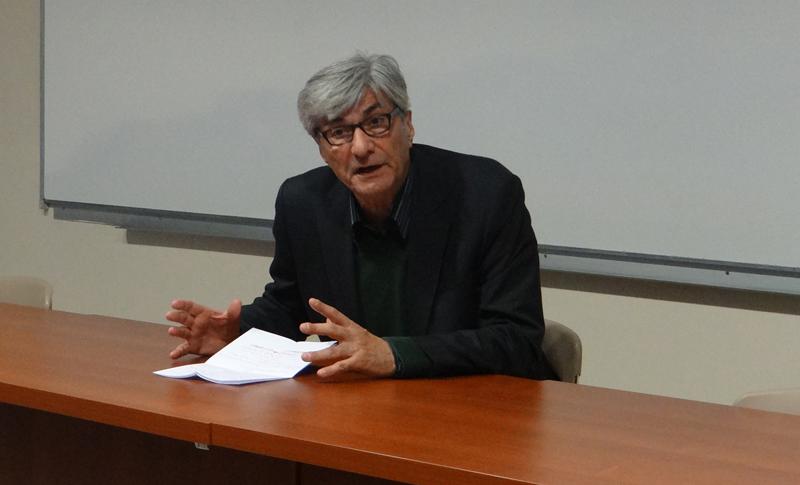Arabic Literature Through Years of Change

The Department of Humanities hosted a lecture by renowned Lebanese poet Jawdat Fakhreddine on “Literature and Upheaval in the Arab World” January 31 on LAU’s Beirut campus.
Fakhreddine, who holds a PhD in Arabic Literature, is a lecturer at LAU and AUB, and a professor of Arabic literature at the Lebanese University. He has published more than ten poetry collections, and was awarded the Sheikh Zayed Book Award in 2014. His poems have been translated into German, French, and English.
Addressing the students, most of whom were not Arabic language majors, Department of Humanities Chairperson Paul Tabar underlined the significance of hosting such lectures as part of LAU’s “education philosophy, which is based on the concept of broadening the knowledge of students beyond their majors or areas of specialization.”
Fakhreddine’s lecture centered on Arabic literature’s response to the political and social crises in the region over the years.
“The Arab reality has been precarious for the past seven decades, for 70 years, more specifically since the [Palestinian] Nakba,” he said. Since then, he added, the Arab world has witnessed major events such as the 1967 defeat, the death of Egyptian President Gamal Abdel Nasser in 1970, the 1973 war, the 1982 Israeli invasion of Lebanon, the 2006 Israeli war on Lebanon, and most recently the so-called “Arab Spring” and the ensuing wars in Syria, Iraq, Yemen and Libya.
Fakhreddine posed several questions: What was the role of literature in light of these developments? Did literature benefit from them? Did it extract elements to envision the future?
He identified two literary reactions to past events. The first he described as hasty and instant as “it tried to address the event the minute it took place or shortly afterwards.” The second, more contemplative in nature and cautious, was able to address the root causes of those incidents and predict their long-term repercussions.
He noted that poems produced on the spur of the moment, in an outpour of emotion, may not be remembered years later, whereas those that are a byproduct of contemplation and delve into events and their significance made their mark on the literary scene.
Iraqi Badr Shakir Al-Sayyab and Syrian Adonis, for example, were poets ahead of their time who had predicted the future through their verse. “They did not limit their writings to addressing the events themselves; rather, they tried to look further, into the future, into what these events could lead to and how they might develop.”
Fakhreddine also addressed the deteriorating quality of modern Arabic literature and lamented the decreasing readership in the Arab world. He called for an overhaul of Arabic education to address “the crisis the Arabic language” is witnessing, noting that the issue can be remedied in schools as early as elementary classes.
Finance major Ziad Ghazal, who took an elective in Pre-Islamic and Umayyad Poetry, said that it was important to become more acquainted with Arabic literature. “Language is essential in our society. We must know our roots, which is our language. We must know more about poetry, but unfortunately there was no awareness in school up until the 10th grade when they introduced us to the first Arabic poem.”
Marketing major Jana Hsaiky, meanwhile, chose Modern Arabic Poetry as it was “the more esthetic part of literature. I have always enjoyed reading poetry and the art of words.”